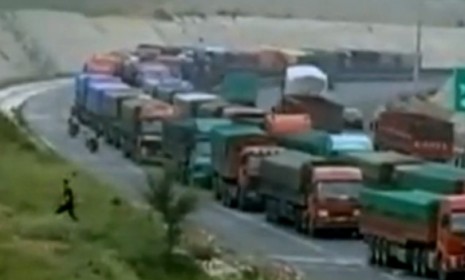China's 'nightmarish' 60-mile traffic jam
In Beijing, a major freeway has been jammed up for 10 days. How did that happen — and what are the stranded drivers doing to stay sane?

A free daily email with the biggest news stories of the day – and the best features from TheWeek.com
You are now subscribed
Your newsletter sign-up was successful
China's Beijing-Tibet Expressway is the site of an almost unbelievable traffic jam that has persisted for 10 days and counting. Here's how a backed-up freeway has become a semipermanent feature of Beijing's landscape: (Watch a CBS report about the traffic jam.)
What caused the jam?
Originally, road construction. But breakdowns and minor car wrecks have added to the congestion. The main problem, though, is that China doesn't have enough infrastructure to meet the skyrocketing rise in automobile use and freight transport.
The Week
Escape your echo chamber. Get the facts behind the news, plus analysis from multiple perspectives.

Sign up for The Week's Free Newsletters
From our morning news briefing to a weekly Good News Newsletter, get the best of The Week delivered directly to your inbox.
From our morning news briefing to a weekly Good News Newsletter, get the best of The Week delivered directly to your inbox.
How long will the snarl last?
Government officials warned that it could persist until the highway construction is finished in mid-September. While state media claimed Monday that traffic flows were "basically back to normal" — a relative measure in congestion-choked Beijing — other reports had the gridlock spreading to a parallel highway. Vehicles in the jam are moving at an average speed of about 2 miles per day.
Who's stuck in the traffic?
Mostly trucks, many of them carrying coal. The recent safety-related closure of coal mines in Shanxi province has resulted in more Chinese coal being transported by road from farther-flung provinces.
A free daily email with the biggest news stories of the day – and the best features from TheWeek.com
What are the drivers doing?
According to Chinese state media, drivers are playing roadside card games to pass the time. Entrepreneurial vendors are hawking water, fruit, nuts, instant noodles, and cigarettes at sharply inflated prices. Criminals have also descended on the scene, robbing some drivers and attempting to siphon gas from stationary vehicles. Yet unbelievably to those of us in the West, says Paul Wachter in AOL News, there aren't any signs of "everyday road-rage violence."
Is this the biggest traffic jam on record?
Probably not. According to Guinness World Records, France got hit by a 109-mile jam between Lyon and Paris for one day in 1980. And its duration isn't a record either — even locally: The Beijing-Tibet Expressway was also halted by a similar month-long snarl in July.
What is China doing to get traffic flowing again?
Beijing has deployed 400 traffic cops to the freeway. Longer-term, the government is building new roads and rail lines. "The situation may ease in three or four years," says David Fang at the China Coal Transport and Distribution Association.
But will it really?
Maybe not. Horrible pollution and rising economic inequality aren't the only "side effects of China's scorching economic growth," says Jamil Anderlini in the Financial Times. With the Asian powerhouse zooming by the U.S. in car ownership, at a rate of 10 million vehicles a year, "traffic jams like this could become much more common," regardless of how many new roads are built.
Sources: Global Times, BBC News, Time, NPR, AOL News, Gawker, Bloomberg, Financial Times, Forbes, Daily Telegraph